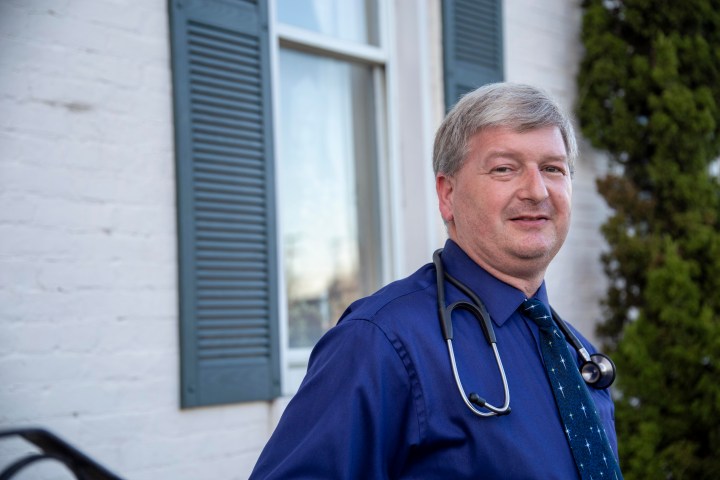
We talked to 10 people who roughly represent the 164 million-person U.S. labor force. Ten stories, one question: “Is the economy working for you?” Meet Scott.
- Name: Dr. Scott Anzalone
- Occupation: Independent family physician
- Based in: Logan, Ohio
- Daily commute: Eight minutes by car or a 24-minute bike ride
- Age: 51
The numbers on Scott:
- Like nearly 5% of the U.S. labor force, Dr. Scott Anzalone is self-employed. He owns a family medical practice in Logan, Ohio.
- A teaching position with Ohio University also puts him in the 5.1% of the workforce with more than one job.
- The Bureau of Labor Statistics would categorize his occupation under “management, professional and related occupations,” along with 4 in 10 US workers.
Dr. Scott Anzalone has been in private practice in Logan, Ohio, for 20 years. He describes himself as the “last physician standing in private practice in the region,” as others have retired or been bought out by large health care systems. Maintaining a private practice in rural community isn’t easy. He balances the needs of his patients with the demands of operating the business, serving as president of the local school board and a part-time position with Ohio University’s school of medicine. His university and school board positions offer retirement benefits, something that can be tough to get when you’re self-employed. In the two decades he’s lived in Logan, Anzalone has seen the community change by the arrival of Walmart, declines in the manufacturing economy, and more recently by the opioid crisis.
What kind of training did you have to do to get the job you have now?
Four years of undergraduate education in biology, molecular biology and biotechnology. Four years of medical school (two years of didactics and two years of clinical rotations). And then three years (about 10,000 hours) of family medicine residency, including high-risk obstetrics.
What’s the one tool you can’t do your job without?
The one tool I cannot do my job without is my experience and training. My extensive training and 23 years of experience allows me to care for patients whether in the comfort of my office or on the tailgate of a pickup truck in the mountains of the Dominican Republic.
What’s the hardest part about your job that nobody knows?
The hardest part of my job that no one knows. I would say that the commitment I have to my patients and my community is a part of me that comes at the expense of my personal mental and physical health. The intelligent part of me says the stress of the job is going to shorten my life and I should find a way to move on to something easier with less commitment and stress, however, the same question burdens me. Who will care for my 4,000 patients? I can’t find a partner willing to come to our small community to share the work load. I have turned down several offers that would make my life easier, but I feel dedicated to my patients and my staff that need me for their financial survival as well.
When you were a kid, what job did you think you were going to have when you grew up?
Being a physician was my God-given calling because I don’t ever remember deciding that is what I was to do. I just remember that was my path.
What was your first job?
I worked on neighboring farms’ haying fields milking cows from the age of 13. My parents could provide our needs but were not wealthy, so I had to work hard for extras.
Click the media players below to hear how Scott’s story evolved:
There’s a lot happening in the world. Through it all, Marketplace is here for you.
You rely on Marketplace to break down the world’s events and tell you how it affects you in a fact-based, approachable way. We rely on your financial support to keep making that possible.
Your donation today powers the independent journalism that you rely on. For just $5/month, you can help sustain Marketplace so we can keep reporting on the things that matter to you.












